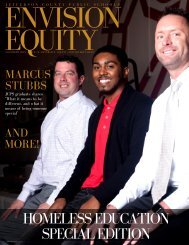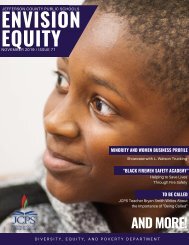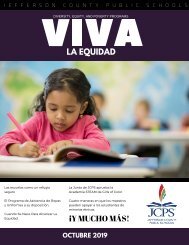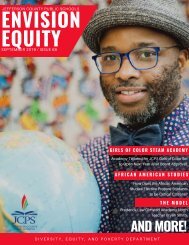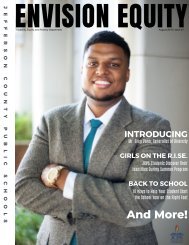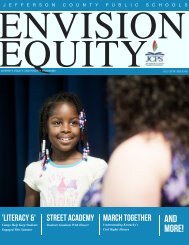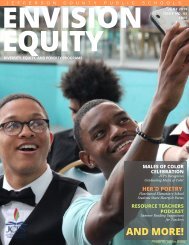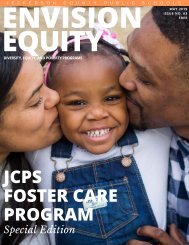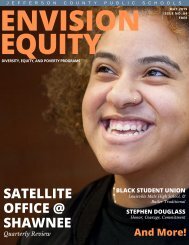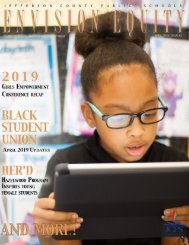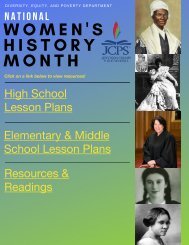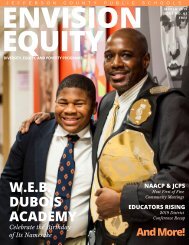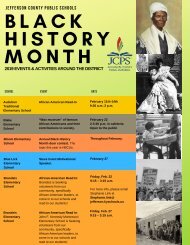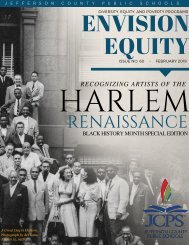Create successful ePaper yourself
Turn your PDF publications into a flip-book with our unique Google optimized e-Paper software.
E N V I S I O N<br />
EQUITY<br />
EDUCATORS OF<br />
COLOR NIGHT<br />
T H E M O D E L<br />
Mrs. Valencia Blair<br />
GHOST BOYS<br />
AND<br />
MORE!<br />
!1
GHOST BOYS<br />
Thomas Jefferson Middle<br />
School Students & Staff Read<br />
Book That Talks About Race<br />
By Dr. Geneva Stark, Rachel Klein, Teela Scrubb<br />
and Ricky Owens.<br />
What does changing a whole school’s<br />
culture look like? Well, for<br />
beginners, it looks like a teacher and a<br />
student next to each other, turning the<br />
pages of a book. It looks like an attendance<br />
clerk asking a student what chapter was<br />
their favorite. It sounds like a recording of a<br />
student reading the book, modeling<br />
fluency. It looks like an 8th grader and a 6th<br />
grader debating what the main character<br />
meant on page 50. It feels like the<br />
revelations that teachers have when they<br />
realize that the very students sitting in their<br />
classrooms can speak to the lived<br />
experiences the characters of the book<br />
Continue on next page<br />
!2<br />
Photos: Continue<br />
Photos, Abdul on<br />
Abdul<br />
next Sharif page<br />
Sharif
ENVISION EQUITY OCTOBER <strong>2019</strong><br />
describe. In<br />
essence, it looks<br />
like Thomas<br />
Jefferson Middle<br />
School’s (TJMS)<br />
school-wide read<br />
of Ghost Boys by<br />
Jewell Parker<br />
Rhodes, and it<br />
looks promising.<br />
This past summer,<br />
7th grade counselor Teela Scrubb and TJMS’s Racial <strong>Equity</strong> Team were cleared<br />
to begin planning ahead for a new initiative- a school-wide book read. And<br />
when I say “school-wide”, I mean not just teachers and students, but<br />
classified (custodians, cafeteria workers, clerical and support staff) staff as<br />
well. They dug deep into the themes, messages, words, and events of Ghost<br />
Boys, preparing lessons, materials, and resources that would allow everyone<br />
to read the book more comprehensively. Principal Kimberly Gregory<br />
supported this work to the extent that she allowed for 15 days to be set aside<br />
in all grades, at the same time during the day, which is such an important<br />
thing to stop and take note of: When leadership shows support, when<br />
leadership values cultural shifts, when leadership leverages budget and<br />
scheduling to allow for an initiative to work, it makes the work so much easier<br />
to see through on a large scale, such as a school-wide book read. It also<br />
communicates to a staff member, “Hey. This is important and I support it.”<br />
Anyway, back to it.<br />
Continue on next page<br />
!3
Ms. Scrubb reached out<br />
to Dr. Geneva Stark,<br />
inviting her in to see the<br />
first few days of<br />
implementation. Dr. Stark<br />
brought me in, knowing<br />
that as a DEP resource<br />
teacher, I serve middle<br />
schools. I am so thankful<br />
that I had the opportunity<br />
to tag along, because my eyes were opened within minutes of stepping into<br />
the first classroom we observed. The school year had begun not more than 8<br />
days prior to us coming, and here sat students actively engaged in a text,<br />
asking tough questions, and sharing their collective brilliance. Classes had<br />
established some background knowledge about some of the historical<br />
people and events referenced in the text so that everyone could approach<br />
the text with a similar working knowledge. All students were empowered<br />
and capable of raising concerns about race, bias, injustice, and societal<br />
unfairness, and… they were. They were asking deep questions. They were<br />
hanging on every word. They were processing historical events and<br />
contextualizing them within the current reality of the world’s inequities.<br />
Dr. Stark and I returned each week to observe implementation in each of the<br />
grade levels at TJMS, and took the time to interview students and adults on<br />
their feelings around the school-wide book read. 7th grade ELA teacher<br />
Benjamin Welp had some deep insights around the program, suggesting<br />
that it advanced the teacher-student relationship development timeline<br />
significantly: Mr. Welp 7th grade teacher stated, “It is powerful that we are<br />
Continue on next page<br />
!4
able to connect things in history<br />
(Civil Rights Movement) with<br />
what is happening today. An<br />
opportunity I wouldn’t have had<br />
anywhere else to discuss race<br />
and have these types of<br />
conversations. This has allowed<br />
me to share experiences,<br />
vulnerabilities, bias, insecurities,<br />
and just being unaware of my<br />
students lives. Reading Ghost<br />
Boys has allowed relationships to happen sooner with students. This is<br />
allowing us at TJ, to build a stronger community. It has been an amazing<br />
communal effort. It is powerful for us to be able to connect things in history<br />
(Emmett Till) with current things that are happening Black Lives Matter<br />
movement (Mike Brown) . If we don’t talk about the things that make us feel<br />
uncomfortable, they will continue to happen.” can review his interview and<br />
add some poignant<br />
Ms. Ransdall, Resource Teacher:<br />
“Ghost Boys is Current Big Read at TJ. All students and staff members are<br />
reading a little bit more about racial equity. Every staff member and student<br />
is engaged in Ghost Boys. It is powerful that all staff members are able to<br />
have conversations with students about race.<br />
It is helping students realize that these are real issues happening in our<br />
community. We are providing students with platforms to have<br />
conversations with each other and adults in speak their truth. We are<br />
Continue on next page<br />
!5
ENVISION EQUITY OCTOBER <strong>2019</strong><br />
hoping students will be able to speak about Ghost Boys in their families<br />
and community.”<br />
Ms. Freeman, Nutritional<br />
Service Worker:<br />
“In the book Ghost Boys the<br />
police never gave the kid a<br />
chance. They never checked<br />
to see if the gun was real or<br />
not. It is heartbreaking. This<br />
is playing out in today's<br />
society. It was good for<br />
students to read the book so<br />
that they can see what is happening in our society.<br />
It was a good read for staff members, because if I see students who are<br />
having a bad day, I try to talk to them. This was a good book for the<br />
entire school to read.”<br />
Students had plenty to say, too. (again Dr. Stark, please provide some<br />
good quotes)<br />
Student 1 ( Yoel):<br />
“Ghost Boys tells me a lot about our civil rights movement and history,<br />
things haven’t really changed much. We need to make a change in the<br />
world on how we treat people. Everyone should be equal! It is important<br />
for the school to have this conversation regarding this really great book,<br />
because people are still really biased and racist toward other people. We<br />
want students to mature and not act like other people.”<br />
Continue on next page<br />
!6
ENVISION EQUITY OCTOBER <strong>2019</strong><br />
Student 2 (Fatou):<br />
“Ghost Boys is about the civil rights movement and how we need to<br />
change our world, there's so much racism, discrimination and racism<br />
from the past to the future. There's a lot of inequality. We need to<br />
change to have a better future. We are still dealing with different<br />
cultures and racism. The book helps kids learn more about what is<br />
happening in the world.<br />
All of the stories students had with teachers led to conversations<br />
regarding black lives matter. We should always do the right thing, no<br />
matter what.<br />
Ghost Boys allows white teachers to be more aware of situations and<br />
help black students feel more comfortable in their classes.”<br />
Student 3 (Ramon):<br />
“Reading the book has helped students to have a conversation with<br />
teachers. The book makes you think about society. It makes you think<br />
about being aware of what’s happening in our society. I have reached<br />
out to not only teachers but also the security guard.”<br />
Student 4 (Josie)<br />
“Ghost Boys is about a kid who was shot for no reason, for his skin color.<br />
It is about justice. The book was amazing overall. My classmates and I<br />
have a project on how we can change racism. The teachers bring in<br />
multiple comments and it is really good how they bring in their<br />
perspectives on how we can change it. I am Latina, and we get a lot of<br />
Continue on next page<br />
!7
ENVISION EQUITY OCTOBER <strong>2019</strong><br />
comments about changing America. We are a part of America. We<br />
know how it feels to be judged. We are open minded and we love<br />
everyone.”<br />
My name is Ricky Owens, and I am the Youth Services Center<br />
Coordinator at Thomas Jefferson Middle School. I have been here for<br />
25 years and have never been prouder of our school. We embraced the<br />
true spirit of Racial <strong>Equity</strong> over the past year. Teachers and staff first<br />
accepted the challenge of having genuine conversations of the impact<br />
of race not only in school but in our everyday lives. Ghost Boys was<br />
used as a conduit to extend that conversation to our students. The<br />
book’s impact went beyond just the discussion and data. The realworld<br />
stories both historical<br />
and current of the struggles<br />
Black people go through<br />
created a level of empathy<br />
and understanding that our<br />
students and staff will carry<br />
with them forever. The<br />
residual effects are evident<br />
beyond race such as:<br />
strengthening relationships<br />
amongst teachers and students and the simple desire to make the<br />
world and our school a better place. The Racial <strong>Equity</strong> Team,<br />
leadership, teachers and our students deserve kudos for their<br />
extraordinary commitment to this work. Given the diversity of our<br />
school we recognize the importance of this endeavor and will continue<br />
to celebrate and embrace it.<br />
Continue on next page<br />
!8
ENVISION EQUITY OCTOBER <strong>2019</strong><br />
Teela Scrubb, (7th Grade Counselor, Racial <strong>Equity</strong> Team Lead):<br />
I feel so incredibly thankful and excited to be serving in a school<br />
district that not only recognized the need for a Racial <strong>Equity</strong> Policy,<br />
but acted upon this need. Our school’s Racial <strong>Equity</strong> Team has been<br />
empowered to engage our staff and students in this equity work. Our<br />
Ghost Boys Big Read provided us with the opportunity to delve deeper<br />
into topics around race, race relations, implicit bias, and empathy. Our<br />
teachers and students showed such courage, vulnerability, and a<br />
willingness to be<br />
open, listen, and<br />
contribute to<br />
the rich<br />
conversations<br />
that took place<br />
during our<br />
reading. Our<br />
hope is that this<br />
work and<br />
conversation<br />
will continue.<br />
Steven Stigall (Racial <strong>Equity</strong> Team Member)- Reading Ghost Boys has<br />
given our students some insight into the difficult conversation about<br />
race that our country has been having for centuries. They have<br />
connected this fictional story to real-life biases, prejudice, and<br />
violence towards black people that exist. I feel we have empowered<br />
Continue on next page<br />
!9
ENVISION EQUITY OCTOBER <strong>2019</strong><br />
our students to think critically and to critically question why some<br />
things are the way they are.<br />
I keep coming back to the thought of how deeply impactful this<br />
approach to culture is- any student can talk to any other student or<br />
adult about the book, which creates so many layers of support, trust,<br />
and safety for each student. It forces the truth and ugliness of racism,<br />
implicit bias, and prejudice to the forefront of an entire school’s<br />
community, and allows them to face it head-on. It creates environments<br />
in which diverse discourse, tough history, and current events are<br />
embraced, celebrated, and encouraged. It brings the real world back<br />
into the classroom.<br />
The Ghost Boys school wide read at TJ Middle School was truly an<br />
example of the Racial <strong>Equity</strong> Policy at work in JCPS. I applaud Principal<br />
Kim Gregory for her courageous leadership, Teela Scrub, Ricky Owens,<br />
the Racial <strong>Equity</strong> team, TJ students, faculty and staff for their<br />
engagement and commitment to diversity, inclusion, compassion and<br />
empathy.<br />
!10
ENVISION EQUITY OCTOBER <strong>2019</strong><br />
W.E.B. DUBOIS ACADEMY STUDENTS<br />
LEARN CULINARY ARTS SKILLS<br />
DURING MENTORING PROGRAM<br />
By Greg Vann—Generalist of Black Male Achievement<br />
W<br />
.E.B. DuBois Academy<br />
students participate in<br />
“passion classes” for one<br />
period each Friday. This is an<br />
opportunity for DuBois staff to teach<br />
students about a topic that isn’t in<br />
their everyday curriculum, and it<br />
allows the staff to form a unique<br />
Photos, Abdul Sharif<br />
relationship with the students<br />
because they can bond over a hobby<br />
of they enjoy. DuBois Academy<br />
Counselor, Mrs. Paula Cathey, decided<br />
to do a cooking class with a group of<br />
15 young men. Through relationships<br />
and networking, a partnership was<br />
made between the DuBois Academy<br />
Continue on next page<br />
!11
and Jefferson<br />
Community and<br />
Technical College<br />
(JCTC) and now the<br />
class is called<br />
“College<br />
Connections<br />
through Cooking.” At<br />
least two Fridays per<br />
month, JCTC<br />
Culinary Arts<br />
students have<br />
agreed to assist in<br />
teaching students at DuBois Academy cooking lessons that they can use for<br />
themselves or to consider as a possible career pathway in the future. But<br />
that isn’t the<br />
only reason<br />
these young men<br />
want to learn<br />
how to cook.<br />
Multiple<br />
students,<br />
including Derrick<br />
Booker, stated<br />
that they want to<br />
learn to cook to<br />
“give back to<br />
others.” “I like to<br />
cook because my<br />
mom puts in a lot of hard work, so I want to learn how to cook so when she<br />
is old I can cook and take care of her every day”, Booker said.<br />
Continue on next page<br />
12
Culinary Instructor and Program Coordinator, Chef Juanita Edmondson,<br />
enjoyed the opportunity and raved about her experience. “I love that so<br />
many young men said they want to be able to give back to their mothers. I<br />
learned as much from the students as they learned from me. The<br />
excitement and appreciation the young men showed was so rich!”, said<br />
Edmondson. “Volunteerism is so important to our community, and each<br />
one must teach one to reach one” she said.<br />
During their first session, students learned to cook omelets. As one student<br />
put it, “omelets and lasagna are diverse meals that you can make a bunch<br />
of different ways.” This semester, Paula Cathey plans for the students to<br />
learn how to cook breakfast, lunch, and dinner so that the students can<br />
provide a meal for their families one Saturday in December.<br />
13
The Model<br />
Recognizing Culturally Responsive and Innovative Classroom Teachers<br />
Name: Valencia Blair<br />
School: Fern Creek<br />
Elementary School<br />
Mrs. Valencia Blair is a fourth grade<br />
teacher at Fern Creek Elementary<br />
School. She has taught in Jefferson County<br />
Public Schools for ten years. Mrs. Blair<br />
previously taught at Rangeland Elementary<br />
School.<br />
Mrs. Blair has a Bachelor of Science Degree<br />
in Elementary Education and has<br />
aspirations to earn a principal certification.<br />
When you enter Mrs. Blair’s classroom it is<br />
easy to see that she wants all of her<br />
students to feel welcomed. One of the ways<br />
Mrs. Blair connects with her students is to<br />
keep-up on current trends and she tries to<br />
use language that all of her students can<br />
relate to.<br />
Find out more about Mrs. Blair by watching<br />
her video story.<br />
Click here to view.<br />
14<br />
Continue Photo:<br />
Photo,<br />
Abdul on next Abdul<br />
Sharif page Sharif
<strong>2019</strong> Showcase of HBCU Planning Committee<br />
Sitting: Monica Flowers, Billie Castle, Carol James, Nailah Williams, Naiyana Williams<br />
Row 1: Danielle Hampton, Tonya Trumbo, Shakita Davis, Krishonda Johnson<br />
Row 2: Amber Ladd, Lisa Stringer, Yonbretta Stewart, Ben Johnson, Shanee Whitlock,<br />
Andrea Houston, Ria Chandler<br />
HISTORICALLY BLACK<br />
COLLEGES AND<br />
UNIVERSITIES (HBCUS)<br />
TRANSFORM LIVES<br />
By Layla June West—Howard University<br />
This year marks the 10th<br />
Annual Showcase of<br />
HBCU College and Career Fair.<br />
The Showcase of HBCU exposes<br />
middle and high school<br />
students from around<br />
Kentuckiana to the traditions<br />
and legacy of our nations’<br />
Historically Black Colleges and Universities (HBCUs). HBCUs transform<br />
students into scholars, moguls, teachers, lawyers, doctors, engineers, and<br />
pioneering professionals. These transformations have and continue to shape<br />
our society and communities.<br />
Continue on next page<br />
Photo, Andrea Houston<br />
!15
ENVISION EQUITY OCTOBER <strong>2019</strong><br />
HBCU graduation rates are higher than that of Black students attending<br />
predominantly white institutions (PWIs). According to The Education<br />
Source, “The average institutional graduation rate for Black students at<br />
HBCUs was 37.8 percent, compared with 32.0 percent for non-HBCUs.”<br />
HBCUs generally see higher enrollment rates for women, many of whom are<br />
leading the way in<br />
earning professional<br />
degrees. Xavier<br />
University and<br />
Howard University<br />
are the top two<br />
producers of Black<br />
graduates of medical<br />
school, more than<br />
the top four PWIs<br />
graduating Black<br />
medical students<br />
combined! In<br />
addition, many prestigious graduate schools, law firms, and Fortune 500<br />
companies recruit at HBCUs.<br />
A significant piece of the HBCU legacy are the phenomenal achievements of<br />
alumni. Among their world-renowned alumni are many transformative<br />
giants of American history and culture, including Katherine Johnson (West<br />
Virginia State University), Whitney M. Young, Jr. (Kentucky State University),<br />
Michael Strahan (Texas Southern University), Oprah Winfrey (Tennessee<br />
State University), John H. Thompson (Florida A&M University), and Taraji P.<br />
Henson (Howard University). Locally, HBCU alumni such as Judge Denise<br />
Brown (Howard University), Delquan Dorsey (Central State University),<br />
JoAnn James (Kentucky State University), Dr. F. Bruce Williams (Florida A&M<br />
Continue on next page<br />
!16
ENVISION EQUITY OCTOBER <strong>2019</strong><br />
University), Nikki Jackson (Hampton University), and Al Cornish<br />
(University of Maryland Eastern Shore) continue to make a difference in<br />
our community. The HBCU alumni network is strong and while many<br />
alumni boast about their school, the comradery amongst all is tied by a<br />
loyal bond to tradition and legacy.<br />
Introducing Black youth to HBCUs is incredibly important, and the<br />
diverse, dedicated Showcase of HBCU planning volunteers is working<br />
hard to provide this opportunity. At the juncture between high school<br />
and higher education, many young people are searching for their sense<br />
of purpose. HBCUs locate that purpose by emphasizing the vitality of<br />
Black thought, culture, and political work in a way that inspires students<br />
to pursue excellence in their chosen path. The Showcase of HBCU<br />
planning volunteers embodies this vitality through their diversity.<br />
Together, they represent various educational backgrounds, career fields,<br />
HBCUs, PWIs, sororities, fraternities, and other national organizations;<br />
but they all believe in the viability of HBCUs, their graduates, and their<br />
impact.<br />
The indelible legacies of HBCUs reverberate throughout history and their<br />
alumni continue to inspire and affect change for the better. Please join us<br />
on Friday, November 1, <strong>2019</strong> at the Kentucky International Convention<br />
Center, 2nd Floor - Halls C, D, & E. If you are interested in supporting the<br />
<strong>2019</strong> Showcase of HBCU College and Career Fair, sign up to volunteer at<br />
http://showcasehbcu.com/<strong>2019</strong>volunteers/.<br />
!17
Educators of<br />
Color Night<br />
New Initiative Helps JCPS Teachers Network and Gain Resources.<br />
By Greg Vann—Black Male Achievement Generalist<br />
Did you know that research<br />
shows that the first three years<br />
of teaching are the most difficult for<br />
teachers? One of the keys to closing the<br />
achievement gaps that persist in JCPS is<br />
to recruit and retain teachers of color so<br />
the staff mirrors the demographics of<br />
the students they serve. With less than<br />
25 percent of JCPS teachers being of<br />
color, but more than 50 percent of the<br />
students being of color, the Office of<br />
Diversity, <strong>Equity</strong>, and Poverty (DEP)<br />
decided that it was important to<br />
recognize first-year teachers of color<br />
with a Teachers of Color Night on the<br />
evening of September 19t at the Bates<br />
Community Development Corporation.<br />
Teachers were welcomed with music<br />
and pizza (sponsored by Papa John’s)<br />
and were given coupons from local<br />
businesses supporting this mission.<br />
Photos, Abdul Sharif<br />
Continue on next page<br />
!18
They were reminded of their importance in the district. They expressed concerns about<br />
things they need support with and were connected to resources that will assist them. They<br />
were given advice from veteran teachers, discussed what racial equity looks like in a<br />
school, were encouraged by Dr. Marco Muñoz of Human Resources, and more.<br />
Special thanks to the sponsors of this event: Papa John’s and Victoria Russell; Mane Avenue<br />
Barbershop and owner Greg Hampton; The Barbershop Downtown, LLC, and owner Robert<br />
Whiteside; SuperChef’s Breakfast & More; Dasha Barbours’ Southern Bistro; Bates CDC; and<br />
Nachand Trabue.<br />
19
ENVISION EQUITY OCTOBER <strong>2019</strong><br />
RESTORATIVE<br />
INQUIRY:<br />
The pedagogical practice of<br />
acknowledging and analyzing the<br />
systemic impact of historical<br />
events on stakeholders past and<br />
present equitably.<br />
By Bryan Smith—Teacher, Frederick Law<br />
Olmsted Academy North<br />
Photos, Google Images.<br />
The regal history of America has<br />
afforded countless citizens the<br />
inspiration to contribute to a democracy<br />
that is marveled the world over. Our<br />
forefathers forged America’s destiny<br />
through the intricate workings of<br />
compromises and amendments that made<br />
the promise of equality possible for every<br />
citizen. But what happens when the story<br />
of our illustrious history is taught from a<br />
single lens? Henry Ford stated, “If you<br />
always do what you’ve always done, you’ll<br />
always get what you’ve always got.”<br />
School curriculum has influenced<br />
America’s culture rendering our civic<br />
duties and responsibilities necessary for<br />
the vitality of our country. Daily, future<br />
Continue on next page<br />
!20
stakeholders are indoctrinated with a singular view of America’s history leaving<br />
little scaffolding for students to wrestle with the justice or injustice of the past.<br />
Without the second optical lens, the teaching of topics such as the Indian<br />
Removal Act may result in students feeling guilty, entitled, or simply indifferent.<br />
The need for the second lens of Restorative Inquiry is not simply achieved with<br />
the diversification of historical content colored with the hues of red, black,<br />
yellow, and the limited mentions of courageous women. The Restorative Inquiry<br />
lens enables stakeholders to engage historical content ethically and inclusively.<br />
Could the lack of Restorative Inquiry cause congressional constituents, political<br />
affiliates, and neighbors to fall prey to what George Washington called the “spirit<br />
of party?” America’s wounds, both old and new, can’t be healed by an incomplete<br />
dialogue of history. To support the education of informed and conscious citizens,<br />
practitioners must be willing to place Restorative Inquiry at the heart of the<br />
curriculum. Without restorative conversations, our classrooms numb the minds<br />
of students who struggle to empathize, compromise, or acknowledge one<br />
another. Let’s create our own P.D. for Restorative Inquiry. Contact me at<br />
LouisvilleUnclesVoluteer@gmail.com, Bryan.Smith@Jefferson.kyschools.us, or<br />
21
ENVISION EQUITY OCTOBER <strong>2019</strong><br />
<strong>October</strong> <strong>2019</strong><br />
Check out our monthly update video featuring JCPS Chief of<br />
Communications Renee Murphy, and DEP Generalist, Abdul Sharif, to<br />
find out what DEP has coming up this month!<br />
Click Here to Play<br />
!22
Continue on next page<br />
!23
!24
DATA MANAGEMENT<br />
RESEARCH TECHNICIAN<br />
Each month we will highlight one of the Diversity, <strong>Equity</strong>, and Poverty Department’s Data<br />
Management Research Technicians. This month we would like to introduce you to Michelle Ford!<br />
My name is Michelle Ford. I<br />
have been with Jefferson<br />
County Public Schools for 21<br />
years, and have worked as a DMRT<br />
for the past 6 years. Prior to this<br />
position, I was a secretary to several<br />
Directors, and Principals. I originally<br />
started with JCPS in 1991 at the ripe<br />
old age of 20. My very first job was a<br />
lunch lady at Wilt Elementary. (The<br />
hardest job in this entire District)<br />
On a personal note, I am a proud<br />
mom to a 21 year old son, who is a<br />
JCPS graduate, and is now a senior at EKU.<br />
Photo, Michelle Ford<br />
It has taken a while to get adjusted to my new department; however, I am<br />
thrilled to be here, and look forward to the next chapter.<br />
To contact me, please call 485-3650 or email<br />
michelle.ford@jefferson.kyschools.us.<br />
!25
ENVISION EQUITY OCTOBER <strong>2019</strong><br />
Ever Thought<br />
About Teaching<br />
Abroad?<br />
By Ruchi Malhotra—Director of<br />
Education, Asia Institute-Crane House<br />
Here is your<br />
chance! Crane House is<br />
now seeking<br />
candidates for our Teach in Asia<br />
program. We will be accepting<br />
applications until November 25,<br />
<strong>2019</strong>. For more info check out<br />
our website<br />
www.cranehouse.org and fill<br />
out an online application. If you have any questions on the program, please<br />
contact Ruchi Malhotra at rmalhotra@cranehouse.org or call (502) 632-1215.<br />
Asia Institute – Crane House in now accepting applications for its 31 th annual<br />
summer Teaching-in-Asia Program. Teachers who are selected will conduct a<br />
short-term, intensive, English-training program for teachers and/or students<br />
in China for roughly a month during July 2020. Host teaching sites provide<br />
free rooming, meals, and short day-trips.<br />
The main purposes of the program are to:<br />
• Provide opportunities for Asian teachers and students to improve<br />
their listening and speaking skills in English<br />
• Demonstrate techniques in language teaching<br />
• Share the cultures of America and Asia<br />
• Promote better understanding between Asians and Americans<br />
The focus is on conversational English. Classes usually meet five days a<br />
week, mornings and afternoons, with a schedule set by the local Asian<br />
institution. This intensity allows the Asian teachers and students to<br />
experience an immersion in English and to gain confidence in using the<br />
language in their classes.<br />
Continue on next page<br />
!26
A cost is associated<br />
with the program<br />
(around $2200).<br />
Classroom teaching<br />
experience is<br />
required. Both<br />
practicing and<br />
retired teachers in<br />
any discipline, from<br />
K through collegiate<br />
levels, are<br />
encouraged to<br />
apply. Crane House<br />
Photos, Google Images<br />
conducts orientation<br />
sessions between January and May, 2020. Crane House provides all<br />
required training sessions and coordinates all travel arrangements<br />
(flights, visa, passport, etc.).<br />
Prior to teaching, program participants enjoy an immersion tour (roughly 3<br />
to 4 days) in a major city and take part in touring the major sites. Recent<br />
immersion tours have taken place in Beijing, Xi’an, Hong Kong and<br />
Shanghai. The immersion tour is included in the participants cost (of<br />
$2200) minus the cost of a few meals.<br />
Asian locations vary from year to year; some host sites have been Funan,<br />
Fuzhou, Jiujiang, Chengdu and Urumqi in China.<br />
27
ENVISION EQUITY OCTOBER <strong>2019</strong><br />
Black Student<br />
Unions in JCPS<br />
By Ellen Niehoff—BSU Sponsor Central High School BSU Students<br />
Black Student<br />
Unions play an<br />
important role in<br />
many high schools<br />
across Jefferson County<br />
Public Schools,<br />
empowering students<br />
and offering a safe place<br />
for students to discuss<br />
race. At Central, the<br />
mission of our BSU is to<br />
promote activities of<br />
common interest, as<br />
well as cultural and educational benefits for Black students. As the sponsor of<br />
Central’s BSU, I provide students with the resources they need and advocate on<br />
Photos, Abdul Sharif<br />
their behalf. BSUs are student led organizations Since BSUs are student led, I find<br />
it inappropriate for me to articulate their importance. So I asked my students<br />
about the importance of BSUs.<br />
Chris Johnson, our BSU president said, “Black Student Unions hold importance in<br />
high schools because they express the diversity of high schools and give those<br />
Black students in a high school a place to be able to use their voice freely.”<br />
Continue on next page<br />
!28
Emmanuel White said, “I feel like BSUs in most high schools are important<br />
because there is no space for Black students to express their feelings in an<br />
environment with likeminded individuals.”<br />
Devyn Williams<br />
said, “BSUs are a<br />
way to bring<br />
togetherness in a<br />
school’s Black<br />
community.<br />
Many Black<br />
students come<br />
from very<br />
different<br />
backgrounds and<br />
have different<br />
mindsets but<br />
through being in<br />
BSU, we can find not only the commonalities in our struggles and in our<br />
successes because of the one thing we all share.”<br />
Nabou Diallo said, “It’s <strong>2019</strong>, and now is as important as ever to be conscious,<br />
to be included, to be surrounded by people from all walks of life, especially in<br />
schools, since our generation will most definitely be taking over soon. As well<br />
as math, science, etc. should be taught, the whole concept of equity and<br />
diversity should be acknowledged and taught as we are on our way to the real<br />
world, where tolerance of people of different races, cultures, ethnicities, and<br />
religions is expected. It’s important that we have groups like BSU where not<br />
only black students, but every student is welcome to share their ideas freely in<br />
hopes that they can be put to great use for a better future. Acknowledging the<br />
importance of equity, inclusivity, and diversity takes us one step closer to<br />
Unity.”<br />
Continue on next page<br />
!29
ENVISION EQUITY OCTOBER <strong>2019</strong><br />
Alexis Greenwell said, “Our Black Student Union is an amazing experience that<br />
not only African American students can join but anybody who wants to put<br />
their opinions and thoughts on the past and present situation relating to<br />
African Americans. BSU gives people a space to feel comfortable to talk openly<br />
about topics such as institutional racism, police shootings and a wide variety<br />
of other issues. Not only do we talk about these topics but we are trying to<br />
make a change as much as we can. I hope that everyone has the chance to<br />
experience BSU.”<br />
A common misnomer of Black Student Unions is that they are exclusively<br />
spaces for Black students. BSUs are open to all students. At Central, all<br />
students are welcome to attend. Those who attend BSU meetings are exposed<br />
to information and lived experiences that are different from their own. At<br />
Central, Black students are the majority but this is not the norm across the<br />
district. The experiences of Black students vary from school to school.<br />
Because of this, inclusivity is the core of BSUs, as it allows students who are<br />
marginalized to have a voice. Just as important, it allows others to hear the<br />
experiences of their peers. As we move towards a global society, it is<br />
important for all students to be exposed to various viewpoints and to learn<br />
about history that is often not taught in schools. Black Student Unions are<br />
truly preparing students to be leaders of positive social change.<br />
Black Student Unions have been validated by the Racial <strong>Equity</strong> Plan that<br />
Jefferson County Public Schools introduced last school year. The Racial <strong>Equity</strong><br />
Plan calls for “differentiated supports for schools to better serve students of<br />
color and other marginalized groups.” Black Student Unions serve students of<br />
color while being open to all JCPS students. Under the leadership of Dr. John<br />
Marshall and Dr. Geneva Stark, BSUs are being fully supported by the district,<br />
ensuring that the voices of our students are being heard. The district is<br />
working with all BSUs to ensure we have the resources and supports for our<br />
students. In addition, the district is focused on getting all BSUs to work<br />
together so we are a united group. This summer BSUs from Brown, Central<br />
Continue on next page<br />
!30
ENVISION EQUITY OCTOBER <strong>2019</strong><br />
and Manual went on a Civil Rights tour to Alabama, visiting Selma,<br />
Montgomery and Birmingham. This trip allowed our students a chance to<br />
learn about the struggles and sacrifices of the Civil Rights Movement and see<br />
what happened when citizens, who were often their age, united together.<br />
Our students saw firsthand the strength that comes with unity and this trip<br />
allowed our students a chance to get to know each other and become<br />
united.<br />
Alexis Greenwell said, “I was one of the few students that got to go on this<br />
amazing BSU trip and it was a great experience being with other BSUs from<br />
different schools who had the same mind set as my BSU at Central. The trip<br />
really gave me a real connection about what Black people went through. I<br />
hope that everyone has the chance to experience BSU.”<br />
Black Student Unions serve a crucial role in Jefferson County Public Schools<br />
and I anticipate the BSUs across JCPS working together and coming up with<br />
solutions to some of the problems that face our district and community.<br />
!31
ENVISION EQUITY OCTOBER <strong>2019</strong><br />
Black Male Educator Q&A<br />
Don Bacon—Teacher, Iroquois High School | Interviewed by Selena Fishback—Director of Teacher Residency Program<br />
When did you have your first black teacher?<br />
or me, it was my 6th grade reading teacher. Part of her independent<br />
reading library was her son’s old X-Men comics, a perfect hook for a budding nerd<br />
like myself. After thinking of her, I thought of all of the black teachers I had<br />
throughout my time in public school. Each of them provided a sense of familiarity I<br />
could never quite comprehend as a kid. I counted through 9 black public school<br />
teachers before I saw a different question.<br />
When did you have your first black male teacher?<br />
Photo Google Images.<br />
Continue on next page<br />
!32
My only black male teacher in public school was my 10th grade social studies<br />
teacher. I’m not sure if he realized it, but he made me critically think in ways I had<br />
never considered. He asked our class why a course called World Civilizations had a<br />
textbook focused so heavily on Western European history. I’ll never forget the<br />
feeling of stunned silence in his classroom on September 11th, 2001. He told us<br />
that America would never be the same after that day.<br />
Have I ever said anything to my students that will stick with them for 15 years?<br />
Moreover, did that stick with me for 15 years because the only teacher I ever had<br />
who looked like me said it? Did those deep questions influence me to become a<br />
social studies teacher?<br />
I’m not sure when you had your first black teacher or if it meant anything to you<br />
when or if you did. However, through my own personal experience and through<br />
recent research, it’s evident there is a dearth of African-American teachers and<br />
their presence in schools makes a difference.<br />
During my first year teaching, I was outside of a colleague’s classroom talking with<br />
some other teachers. A student passed by us and asked if we had decided to have<br />
a meeting. We realized that the six of us standing there was the whole group of<br />
black male educators in our school at that point. We were roughly 6% of the staff<br />
at the time. In the United States, black males only make up 2% of the teaching<br />
workforce.<br />
In Jefferson County Public Schools, 16% of the teachers are minorities and 36% of<br />
the students are black. Black students accounted for more than 65% of<br />
suspensions in JCPS during the 2017-2018 school year. JCPS’s Racial <strong>Equity</strong> Policy<br />
was created, in part, to address these issues.<br />
Continue on next page<br />
33
Research in recent years has shown:<br />
Black students who have one black teacher are more likely to go to college<br />
Teachers of color help lower suspension and drop-out rates of students of color<br />
and help raise their graduation rates<br />
As research continues to develop our understanding of the positive effect<br />
teachers of color bring to our schools, we have to work harder to recruit and<br />
retain teachers of color. The local HBCU, Simmons College and JCPS have created<br />
a partnership to introduce Simmons current students and recent graduates into<br />
teaching careers. I hope these initiatives can create a pipeline for long term black<br />
teachers within JCPS.<br />
As we move towards more equitable staffing of our schools, we have to ensure we<br />
retain teachers of color. My black male teacher left our school the year after he<br />
was my teacher. I don’t know his reasons for leaving, but I do understand the<br />
continuous pressure that comes from being a black male teacher through the<br />
"invisible tax." As JCPS embraces racial equity, we also have to change our<br />
mindsets on what to expect from black teachers. We cannot expect black<br />
teachers to have some inherent abilities to communicate with black students with<br />
behavior issues.<br />
Continue on next page<br />
34
ENVISION EQUITY SEPTEMBER <strong>2019</strong><br />
KYTESOL Conference Accepting Proposals<br />
Proposals are being accepted for the <strong>2019</strong> Kentucky TESOL<br />
Conference, which will be held on <strong>October</strong> 4-5 at the JCPS ESL<br />
Newcomer Academy. The last date for submissions is August 2.<br />
More information, including the link for proposal submissions, can<br />
be found at https://kytesol.wildapricot.org. For additional details,<br />
contact Gwen Snow at gwen.snow@jefferson.kyschools.us or (502)<br />
485-6324.<br />
Creating New Futures for Newcomers<br />
The JCPS ESL Newcomer Academy was featured as a bright spot in<br />
the Mid-Atlantic <strong>Equity</strong> Consortium (MAEC) publication, “Creating<br />
New Futures for Newcomers.” The complete report can be read at<br />
https://maec.org/resource/creating-new-futures-for-newcomers/.<br />
The Louisville Free Public Library Presents:<br />
Exploring the Black Family: Intergenerational Transmission of<br />
Trauma<br />
This new four-part series led by Dr. Steven Kniffley—Associate<br />
Director of the Center for Behavioral Health and Assistant Professor<br />
in Spalding University’s School of Professional Psychology—will<br />
examine how cultural and negative messages are passed down in our<br />
families and how to change our narratives to implement new positive<br />
ones.<br />
Understanding How Cultural Messages are Passed Down<br />
Participants will be engaged in a discussion about the mechanisms<br />
through which both positive and negative messages are shared across<br />
members. For more information, please call (502) 574-1779.<br />
!35
Professional Development<br />
Title Session Code Date & Time Location Contact<br />
Working With<br />
English Learners<br />
19-20105148 <strong>October</strong> 2<br />
4:30 to 5:30 p.m.<br />
Jeffersontown<br />
Elementary<br />
Dr. Monica<br />
Lakhwani<br />
(502) 485-7269<br />
Gender Diversity<br />
and LGBTQ<br />
Inclusion<br />
19-20105226 <strong>October</strong> 9<br />
4:30 to 6:00 p.m.<br />
ESL Newcomer<br />
Academy<br />
Dr. Monica<br />
Lakhwani<br />
(502) 485-7269<br />
High Expectations<br />
for Students of<br />
Color<br />
19-20106296 (Oct.<br />
14)<br />
19-20106301 (Oct.<br />
16)<br />
<strong>October</strong> 14 and 16<br />
(Choose one date.)<br />
4:30 to 6:30 p.m.<br />
Marion C. Moore<br />
School<br />
Southern High<br />
Vanessa McPhail<br />
(502) 485-3631<br />
CIRCLE:<br />
Culturally<br />
Inclusive and<br />
Responsive<br />
Curricular<br />
Learning<br />
Environments<br />
19-20105646 <strong>October</strong> 14<br />
4:00 to 5:30 p.m.<br />
Simmons College<br />
Parrish Hall<br />
(Multipurpose<br />
Room), 1018 S. 7 th<br />
Street<br />
Dr. Monica<br />
Lakhwani<br />
(502) 485-7269<br />
Introduction to<br />
School-Based<br />
Decision Making<br />
(SBDM members<br />
only)<br />
19-20104885 <strong>October</strong> 15-16<br />
4:30 to 7:30 p.m.<br />
Highland Middle<br />
School<br />
Dr. Shawna Stenton<br />
(502) 485-3056<br />
Poverty Simulation 19-20105146 <strong>October</strong> 16<br />
4:30 to 6:30 p.m.<br />
Civil Rights in the<br />
Gateway<br />
19-20105650 <strong>October</strong> 17<br />
4:30 to 6:00 p.m.<br />
Marion C. Moore<br />
Traditional<br />
Muhammad Ali<br />
Center<br />
Dr. Monica<br />
Lakhwani<br />
(502) 485-7269<br />
Dr. Monica<br />
Lakhwani<br />
(502) 485-7269<br />
Diversity Mobile<br />
Summit<br />
Search “Mobile<br />
Summit” on<br />
pdCentral to see<br />
the session codes.<br />
<strong>October</strong> 17<br />
4:30 to 6:30 p.m.<br />
Rutherford<br />
Elementary<br />
Dr. Monica<br />
Lakhwani<br />
(502) 485-7269<br />
Culturally<br />
Responsive<br />
Reading<br />
19-20105157 <strong>October</strong> 21<br />
4:30 to 6:30 p.m.<br />
Carrithers Middle<br />
Dr. Monica<br />
Lakhwani<br />
(502) 485-7269<br />
Integrating African<br />
American<br />
Literature<br />
19-20106046 <strong>October</strong> 23<br />
4:30 to 6:30 p.m.<br />
King Elementary<br />
Dr. Monica<br />
Lakhwani<br />
(502) 485-7269<br />
Educate, Motivate,<br />
Activate<br />
19-20105677 <strong>October</strong> 28<br />
4:00 to 5:30 p.m.<br />
Muhammad Ali<br />
Center<br />
Dr. Monica<br />
Lakhwani<br />
(502) 485-7269<br />
Inclusive Spaces in<br />
Our Classrooms<br />
19-20105751 <strong>October</strong> 30<br />
4:30 to 6:30 p.m.<br />
Muhammad Ali<br />
Center<br />
Dr. Monica<br />
Lakhwani<br />
(502) 485-7269<br />
36
Diversity, <strong>Equity</strong>, and<br />
Poverty Department<br />
GIRLS OF<br />
COLOR<br />
COMMUNITY CONVERSATIONS<br />
Please join us for our <strong>2019</strong>-20 Girls of Color Community<br />
Conversations, featuring local and national experts who<br />
will share their research, best practices, and strategies to<br />
teach and reach girls of color in our public schools.<br />
Dates & Speakers<br />
Dr. Crystal deGregory, Independent Scholar<br />
Dr. Cherie Dawson-Edwards, University of Louisville<br />
<strong>October</strong> 17 | 6–8 p.m. | W.E.B. DuBois Academy<br />
Dr. Crystal deGregory will present on the<br />
importance of the HBCUs and a sense of belonging for<br />
girls of color.<br />
January 22 | 6pm–8pm | W.E.B. DuBois Academy<br />
Dr. Cherie Dawson-Edwards will present on the history<br />
and examples of injustice inside the school system.<br />
March 25 | 6pm–8pm | W.E.B. DuBois Academy<br />
Sam O’Bryant from SchoolSeed in Memphis, TN, will<br />
share his research on what an urban city needs to do in<br />
order to loosen the grip of whiteness and proliferate<br />
equity.<br />
April 23, 2020 | 6pm–8pm | Louisville Urban League<br />
Dr. Shantel Crosby will discuss the book Sister Citizen and<br />
the disparate impact befallen Black girls.<br />
For more information, or to R.S.V.P., please contact Vanessa McPhail at<br />
485-3631 or email vanessa.mcphail@jefferson.kyschools.us.<br />
Sam O’Bryant, SchoolSeed, Memphis<br />
Dr. Shantel Crosby, University of Louisville<br />
!37
38
!39
!40
J E F F E R S O N C O U N T Y P U B L I C S C H O O L S<br />
D I V E R S I T Y , E Q U I T Y , A N D P O V E R T Y<br />
F L A S H D A D S<br />
Flash Dads will:<br />
•Pledge to support and encourage JCPS<br />
students at ten different schools located<br />
throughout Jefferson County.<br />
.•Be present once a month to greet students as<br />
they arrive at school in the morning.<br />
•Be a positive role model for our students.<br />
August 28, <strong>2019</strong><br />
September 26, <strong>2019</strong><br />
<strong>October</strong> 30, <strong>2019</strong><br />
November 20, <strong>2019</strong><br />
December: NO FLASH DADS<br />
DATES:<br />
January 29, 2020<br />
February 26, 2020<br />
March 25, 2020<br />
April 22, 2020<br />
May 13, 2020<br />
For more information, contact 485-3799.<br />
!41
BOOK STUDY<br />
WITH<br />
DR. CHERIE<br />
DAWSON-<br />
EDWARDS<br />
*Participants must attend<br />
all three sessions in order<br />
to receive PD credit.<br />
!42
ï<br />
Coaching Students with DACA<br />
College Access<br />
DACA and undocumented students can go to<br />
KY colleges and universities.<br />
Per CPE policy KRS 13:0245 Section 8:<br />
An undocumented student who graduates<br />
from a Kentucky high school can enroll at<br />
Kentucky colleges/universities as in state<br />
residents for tuition purposes.<br />
Need help navigating the application process?<br />
Contact Assistant Director, Diversity<br />
Recruitment Aimee Huffstetler<br />
502.852.1295, aimee.huffstetler@louisville.edu<br />
Scholarships<br />
These scholarships and resources are<br />
open to DACA, and in some other cases,<br />
undocumented students:<br />
» Migrant Network Collection<br />
» Hispanic Scholarship Fund<br />
» SHPE Foundation<br />
» Latino Student Resource Guide (LLEO)<br />
Resources<br />
» United We Dream (UWD)<br />
» Dream Educational Empowerment Program<br />
(DEEP)<br />
» Scholarships A Z<br />
» My (Un)Documented Life<br />
Programs & Organizations<br />
The Latino Leadership and College Experience<br />
Camp is a local, community based program<br />
that provides college coaching and leadership<br />
development to Latinx and immigrant youth<br />
including undocumented and DACA students.<br />
For more information visit www.thellcec.org<br />
Kentucky Dream Coalition is an immigrant<br />
youth led organization focused on supporting<br />
the undocumented and DACA mented youth<br />
and students in the state through organizing,<br />
workshops and mentoring.<br />
For more information visit www.facebook.com/<br />
kentuckydream/<br />
FAFSA<br />
Unfortunately, undocumented and DACA mented students cannot<br />
receive state or federal fi nancial aid.<br />
DACA students can complete the FAFSA for scholarship purposes.<br />
Step 1: Like all applicants, your firs t step should be to create an FSA<br />
ID for yourself and your family. If parents do not have a SSN do NOT<br />
create an FSA ID with an ITIN (individual tax identifica tion number).<br />
Undocumented parents and students cannot create an FSA ID or use<br />
an ITIN on FAFSA forms at https://fsaid.ed.gov/npas/index.htm<br />
Step 2: There are 6 sections on the FAFSA: Student Demographics<br />
(which includes student eligibility), School Selection, Dependency<br />
Status, Parent Demographics, Financial Information and Sign & Submit.<br />
The two sections that are most confusing for DACA recipients are<br />
the Student Demographic section (particularly, the student eligibility<br />
questions) and Parent Information (if parents are undocumented).<br />
Step 3: Students can enter their income information manually or<br />
through the IRS retrieval tool if they fil ed taxes.<br />
Step 4: If the parents of a DACA recipient are undocumented, they<br />
must also not misrepresent themselves. When reporting parental<br />
information, do not use an ITIN in place of a Social Security Number.<br />
Parental information should be entered as follows:<br />
» A parent can complete FAFSA using ì 000 00 0000î for PARENT<br />
I SSN AND ì 999 99 9999î for PARENT II (Note: if parent holds<br />
ITIN to file taxes, do not use in place of SSN)<br />
» Parentsí income info must entered manually. Do not try to use the<br />
IRS Data Retrieval tool.<br />
» Because parents donít have a SSN, they cannot create an FSA ID.<br />
Therefore, parents must print, sign, and mail in signature page.<br />
There is a bar code on the signature page that will match your<br />
parentí s signature to your specific application once the signature<br />
page is mailed into the FAFSA office listed on the signature page.<br />
There is no need to print the entire application. Just send in the<br />
signature page.<br />
Step 5: On the signature/submission pages, students can sign with<br />
their FSA ID. The parent must sign and mail in the signature page. For<br />
the <strong>2019</strong> 2020 school year, send the parent signature page to:<br />
Federal Student Aid Programs<br />
P.O. Box 7652<br />
London, KY 40472 7652<br />
Step 6: You will be able to check the status of your FAFSA online<br />
via www.fafsa.ed.gov with the same FSA ID and PIN number you<br />
created when you fil ed the FAFSA. Once the parent signature page is<br />
processed, you will be able to access your Student Aid Report (SAR)<br />
to view your EFC (expected family contribution), which is the number<br />
that demonstrates your need This information is important for need<br />
based scholarships.<br />
Adapted from BCTC Latinx Outreach ìC oaching Students with DACAî<br />
!43
ENVISION EQUITY SEPTEMBER <strong>2019</strong><br />
I Got Next<br />
By Daria Peoples-Riley<br />
Greenwillow Books (July 30, <strong>2019</strong>)<br />
For Preschool – 3<br />
Books for Young Readers<br />
Pet<br />
By Akwaeke Emezi<br />
Make Me a World (September 10, <strong>2019</strong>)<br />
For grades 7 – 9<br />
A young boy’s shadow helps him navigate the local<br />
basketball court and encourages him to put his heart<br />
into every move and spin. Vivid illustrations<br />
combine with sharp-witted text to create a picture<br />
book that feels alive.<br />
There are no more monsters left in Jam’s world. At<br />
least that’s what all the adults tell Jam. Pet is a raw<br />
and heartrending read, yet filled with hope and<br />
includes an outstanding black, trans protagonist. Pet<br />
gives us hope for healing in the monsters we all fight<br />
daily.<br />
Sonny’s Bridge:<br />
Jazz Legend Sonny Rollins Finds His Groove<br />
By Barry Wittenstein<br />
Charlesbridge (May 21, <strong>2019</strong>)<br />
For grades 1 – 4<br />
Sonny’s Bridge is the story of jazz legend Sonny Rollins, from young boy to<br />
aspiring jazz artist, his disappearance from the jazz world and his<br />
triumphant return. Dazzling, warm and intimate illustrations deeply convey<br />
Sonny’s life and New York City throughout the Swing and Jazz ages.<br />
Images obtained from Google Images..<br />
!44
ENVISION EQUITY SEPTEMBER <strong>2019</strong><br />
Announcing...<br />
"The Model"<br />
Starting in the September edition of<br />
<strong>Envision</strong> <strong>Equity</strong>, we will highlight sample<br />
lesson plans and videos of Jefferson<br />
County Public Schools (JCPS) classroom<br />
teachers who are culturally responsive and<br />
innovative. This new section of <strong>Envision</strong><br />
<strong>Equity</strong> will be called “The Model.”<br />
If you are a JCPS teacher or know of a<br />
JCPS teacher who should be highlighted as<br />
a model of culturally responsive and<br />
innovative classroom practices, please<br />
submit his or her contact information to<br />
abdul.sharif2@jefferson.kyschools.us by<br />
the 15th of each month.<br />
Editor—Catherine Collesano<br />
Editor, Photo Contributor—Abdul Sharif<br />
Credits<br />
Special thanks to all of our community partners and educators who helped make this special edition of<br />
<strong>Envision</strong> <strong>Equity</strong> possible.<br />
<strong>Envision</strong> <strong>Equity</strong> is a publication of the JCPS Department of Diversity, <strong>Equity</strong>, and Poverty Programs. All<br />
submissions should be sent to Catherine Collesano at catherine.collesano@jefferson.kyschools.us or Abdul<br />
Sharif at abdul.sharif2@jefferson.kyschools.us. If you are interested in becoming a subscriber or a<br />
contributor to <strong>Envision</strong> <strong>Equity</strong>, please contact one of the editors at the above email address.<br />
www.jefferson.kyschools.us<br />
Equal Opportunity/Affirmative Action Employer Offering Equal Educational Opportunities<br />
!45




